A tax increase on rice imported into Nigeria resulted in a massive surge in regional smuggling, thanks to Nigeria’s notoriously porous borders.

A customs inspection point on the Owode-Idi Iroko Road. Photo: Yink Adeparusi
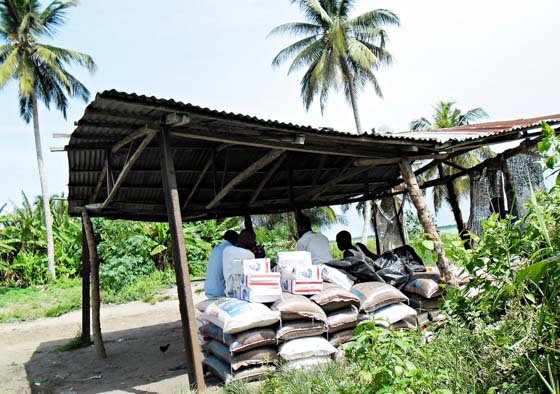
Bagss of rice waiting to be smuggled into Main Badagry Creek at the Gbaji area. Photo: Yinka Adeparusi
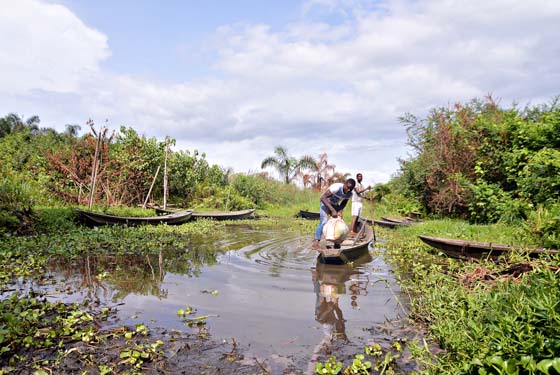
This creek at Yafin serves as a route for smugglers to beat customs. Photo: Yinka Adeparusi
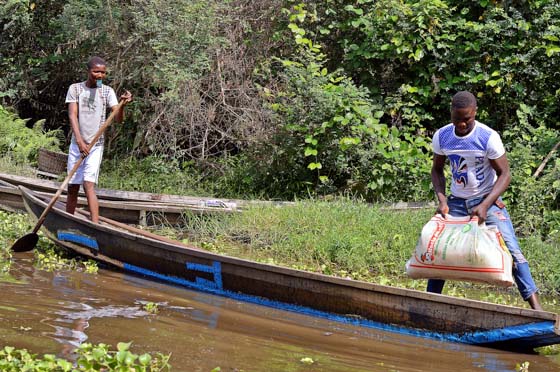
This creek at Yafin serves as a route for smugglers to beat customs. Photo: Yinka Adeparusi
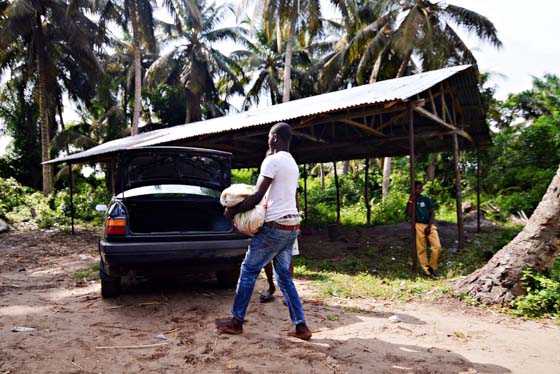
After smuggling along the creek, rice is smuggled via small vehicles. Photo: Yinka Adeparusi
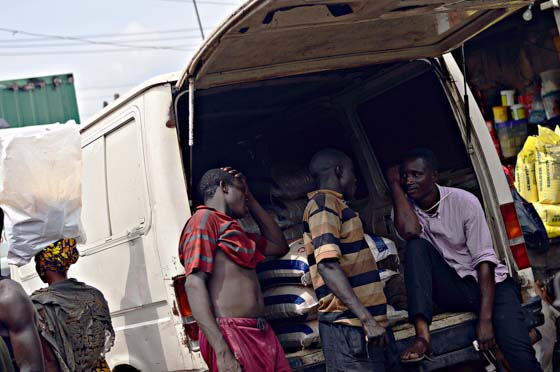
Smuggled rice is delivered, but in small quantities. Photo: Yinka Adeparusi
“Nigeria has no business importing rice… We have a massive amount of land, we have water, we have cheap labor, but we’re using these things to make a market for others. To make Nigeria a world producer of food, we had to reposition agriculture away from ‘farming’ [towards] a money making business.”
Dr. Akinwumi Adesina, Minister of Agriculture and Rural Development
ABUJA, Nigeria—Rice costs are back to comfortable levels for Nigerian consumers after a period of unusually high prices.
That’s thanks to a new policy that addresses the negative effects of a huge tax increase on imported rice, put in place early last year. Initially intended to boost local production, the tax hike led to soaring prices and a booming smuggling market, as major rice exporters from South and Southeast Asia began diverting shipments to Nigeria’s neighboring countries. That led to an influx of cheap rice into Nigeria.
“I met with all of the stakeholders and everybody thought it was time to revise [the policy] downwards,” President Goodluck Jonathan announced in June, “to make sure we don’t have our neighbors allowing cheap rice to be dumped on our market.”
The new policy involves a 30 percent duty for those with Nigerian processing facilities and 60 percent for foreign importers. That’s down from an 110 percent tax in duties and levies on all imported rice. The new graded pricing system incentivizes domestic producers, while lowering the levy just enough to de-incentivize companies that would ship their rice elsewhere and potentially alienate the Nigerian market.
Despite the shift, the government maintains that past efforts to raise the tariff were well intentioned.
“No government decision is made in bad faith,” said Dahiru Ado Kurawa, the Chair of Nigeria’s Presidential Committee on Trade Malpractices and Chair of Nigeria’s Rice Benchmark and Research Committee. “Experience is something we gain every day. There was no document that said ‘three million tons [of rice] will come into Nigeria illegally if you raise the tariff.’”
But many question whether Nigerian tax officials did the necessary due diligence on the effects of the hike, and whether the government was too slow to react to its obvious failure.
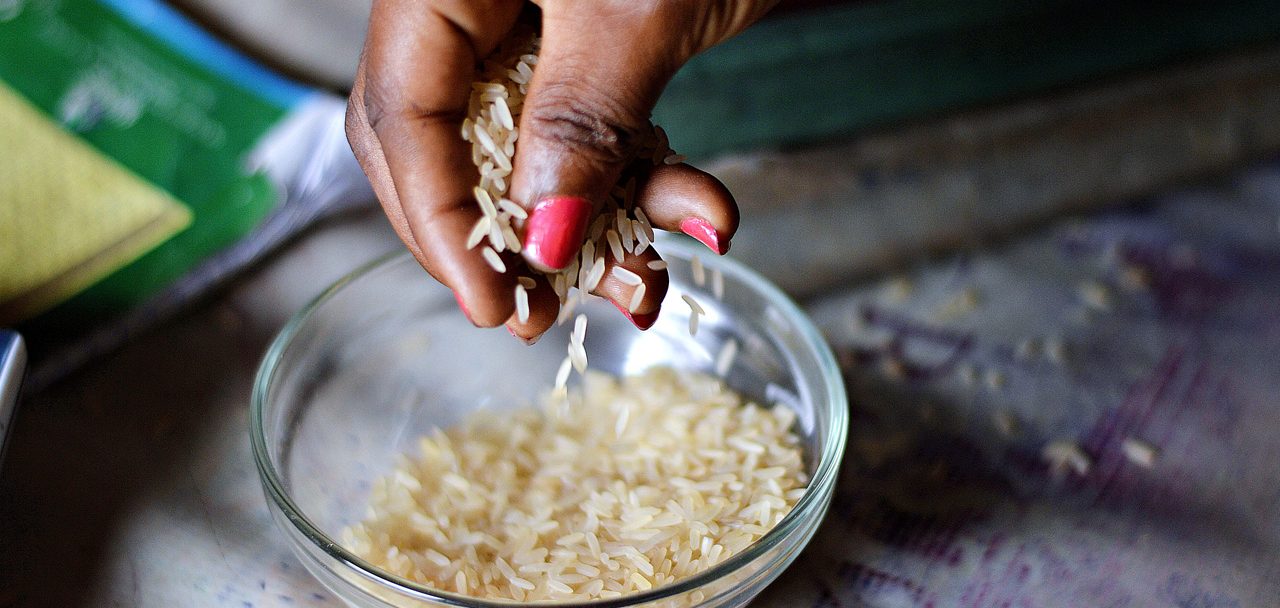

A customs inspection point on the Owode-Idi Iroko Road. Photo: Yink Adeparusi

Bagss of rice waiting to be smuggled into Main Badagry Creek at the Gbaji area. Photo: Yinka Adeparusi

This creek at Yafin serves as a route for smugglers to beat customs. Photo: Yinka Adeparusi

This creek at Yafin serves as a route for smugglers to beat customs. Photo: Yinka Adeparusi

After smuggling along the creek, rice is smuggled via small vehicles. Photo: Yinka Adeparusi

Smuggled rice is delivered, but in small quantities. Photo: Yinka Adeparusi
In the 1960s, Nigeria exported more food than it imported. But a population boom and new oil wealth have changed that. Last year, President Goodluck Jonathan said the country had spent N630 billion, or about $3.8 billion, to import agricultural products in 2012. In 2011, Nigeria was the world’s second biggest importer of rice, bringing in about 2.5 million tons of rice.
In early 2013, in an effort to regain food self-sufficiency, the government increased the tax on imported rice from 50 to 110 percent, a 60 percent hike. The tax was meant to encourage locally produced and processed rice and wean the country off imported rice altogether before a full ban in 2015.
“I come from the view that Nigeria has no business importing rice,” said Dr. Akinwumi Adesina, Nigeria’s Minister of Agriculture and Rural Development. “We have a massive amount of land, we have water, we have cheap labor, but we’re using these things to make a market for others. To make Nigeria a world producer of food, we had to reposition agriculture away from ‘farming’ [towards] a money making business.”
To avoid the huge fees, major rice exporters from South and Southeast Asia began diverting shipments to Nigeria’s neighboring countries—namely Benin Republic to the west and Cameroon to the east—whose governments suddenly began earning millions of dollars in duties.
In 2012, before Nigeria’s tax hike, Benin, a small country of just two million, imported 200,000 tons of white or polished rice—rice that’s had its husk, bran, and germ removed. The country had never been a major importer of parboiled rice. But according to Kurawa, as Nigeria increased its duty in January 2013, Benin imported an additional two million tons of parboiled and partially pre-boiled rice from Thailand and India.
Due to the opaque nature of the transactions, reporting varies widely, but even conservative estimates show Benin’s rice imports doubling in the first six months after the hike. Kurawa estimates a more than 1000 percent increase. That means that tiny Benin suddenly became one of the largest importers of rice in the world.

For Eleanor Osadebe, the one kg bag that usually cost N7,000 went for N13,000 —more than the family’s entire monthly food budget, shaking their handle on household spending and leaving them vulnerable to hunger. So Osadebe started selling tomatoes and peppers to make extra money.
“We used to have rice almost every day, but I had to start preparing cold garri and groundnut for my family,” Osadebe said, referring to a dish of ground cassava, cold water and peanuts, seen by some as a low-income staple.
Despite the bad news for consumers, there were signs of policy success in early 2013, when domestic production increased and 14 states invested in cultivation and processing plants, alongside a number of private companies.
“Rice production in the country has gone up tremendously. Over the period of time since we started the policy, production has expanded by seven million metric tons,” Dr. Adesina said in August of this year. “Our farmers are producing more today than ever before.”
Practically, however, it was nearly impossible for domestic rice producers to build the level of capacity required to mill and process enough rice in time to have a significant effect on the market.
“Our neighboring countries are profiting from the policy,” Dr. Vicky Haastrup, head of the Seaport Terminal Operators Association of Nigeria, said in April. “And because they are benefitting, they give tacit support to smugglers.”
Benin’s presidency could not be reached for comment.
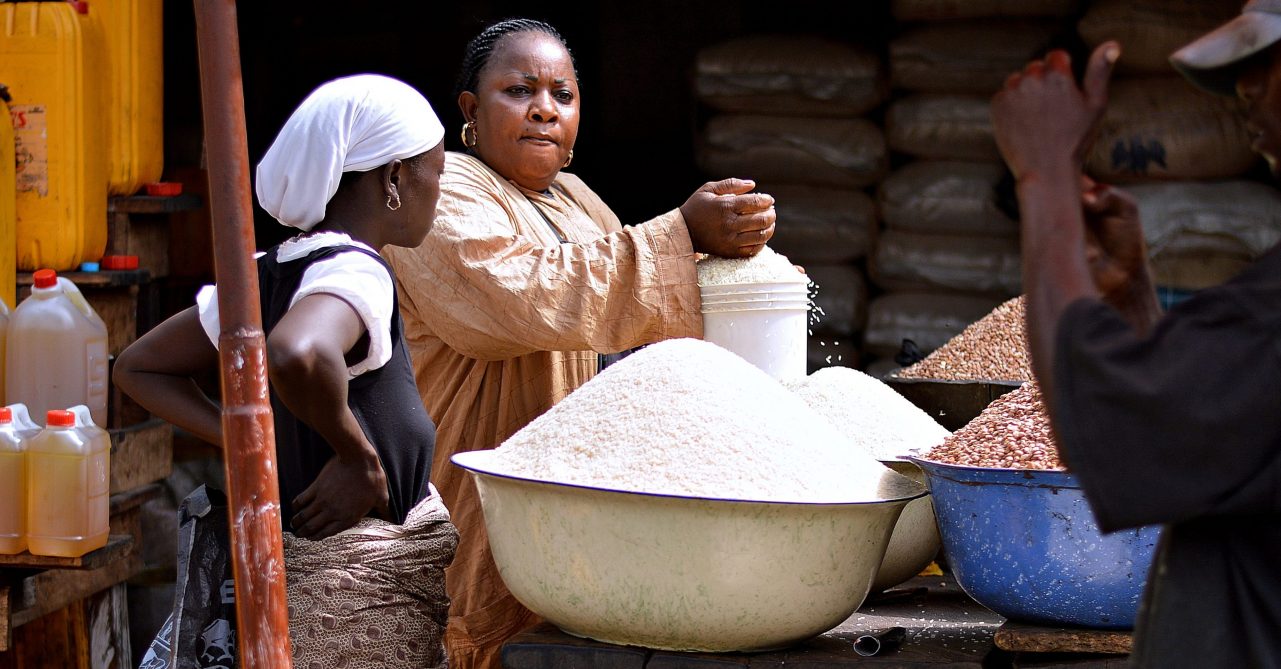
“Nigeria has no business importing rice… We have a massive amount of land, we have water, we have cheap labor, but we’re using these things to make a market for others. To make Nigeria a world producer of food, we had to reposition agriculture away from ‘farming’ [towards] a money making business.”
Dr. Akinwumi Adesina, Minister of Agriculture and Rural Development
“Nigeria has no business importing rice… We have a massive amount of land, we have water, we have cheap labor, but we’re using these things to make a market for others. To make Nigeria a world producer of food, we had to reposition agriculture away from ‘farming’ [towards] a money making business.”
Dr. Akinwumi Adesina, Minister of Agriculture and Rural Development Haastrup said Nigeria lost at least N80 billion (US$492 million) in customs duties in the first quarter of 2014 alone.
Between January and December of 2013, less than 100,000 tons of rice passed through Nigeria’s ports legally, a precipitous decline from the more than two and a half million tons that streamed in the previous year.
For now, analysts are watching to see if the reversal will result in substantial change, and the Presidential Committee on Trade Malpractices says it is ready to make whatever adjustments are necessary to address any new threats to Nigeria’s ample customs base.
Despite the challenges and struggles, the government maintains its previous policy was successful.
“West Africa has to industrialize and you don’t industrialize by becoming a cheap dumping ground for others,” Dr. Adesina said. “We are determined to be a major exporter of food, and we will continue to use tariffs and incentives to protect our markets.”
MORE FROM THIS ISSUE
Chef's Sampler Menu
A note from the editors about what we're serving up.
Illegal Street Tacos
On city streets in Mexico’s largest cities, an esteemed culinary heritage is up against another deeply ingrained, yet less auspicious, tradition: corruption.
Bread Bought with a Bribe
Corruption in Egypt’s bread supply contributed to the historic ouster of President Hosni Mubarak. Yet, with limited reforms enacted since then, the pervasive corruption in Egypt’s wheat market continues to create instability in the country.
Tainted Breakfast Milk
In northern China’s remote Anding District, 244 students simultaneously fell ill last year after eating a school breakfast. Officials say the children made it up.
Mystery Meat School Lunch
More than a year after kindergarten students were sickened from school food, parents say low quality products and those with misleading labels continue to enter Vilnius kindergartens.
Chicken of Questionable Origin
A ranking of 21 OECD countries reveals how well they can trace food in times of crisis.
Conflict Greens
In Brazil’s fertile Amazon region, a movement of landless farmers is struggling against a powerful agricultural giant accused of corruption, unafraid to use deadly force.
Fish & Chips, With a Catch
After unprecedented numbers of fishermen were left jobless following the country’s recent permitting process, some are blaming a lack of transparency and possible corruption.
A Little Curry, No Rice
Nepal, in partnership with the Japanese government, has attempted to reduce the effects of a food shortage by distributing subsidized rice. Yet, these efforts haven’t done enough, and many blame the shortfall on a common culprit: corruption.






